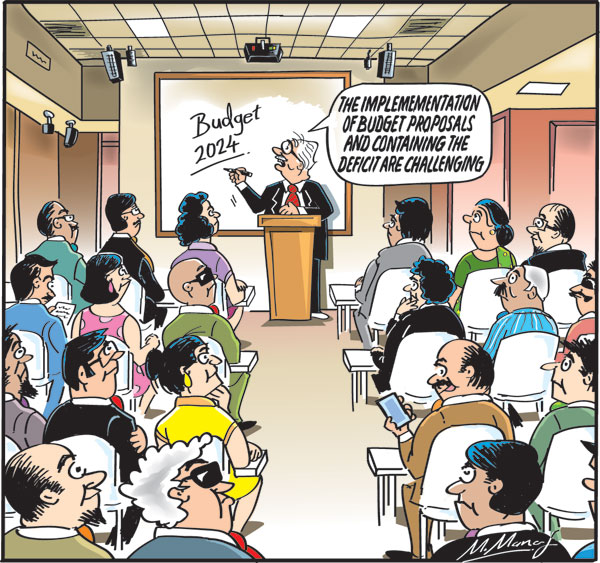Budget 2024’s formidable challenges: Implementing proposals and containing fiscal deficit
View(s): 179
Regular features of the country’s public finances have been overruns in expenditure and shortfalls in revenue. Furthermore, the inability to implement a large number of projects and programmes in budget speeches has also been a regular feature.
2024 budget
Will this be the fate of President Ranil Wickremesinghe’s 2024 budget? How many of his ambitious projects can be implemented? Can expenditure be contained at the budgeted amounts and will the increased revenue materialise?
These are the pertinent issues now that the budget has been passed by parliament.
Predicament
The country’s current predicament, unlike other years, is that the budget deficit has to be addressed, as it is an important condition for the continuation of the IMF’s Extended Finance Facility (EFF). Discontinuance of the IMF programme would be an economic disaster.
Projects
As far as the numerous projects envisaged in the budget are concerned, they are part of budgetary rhetoric. In contrast, the reform programme is mandatory.
No doubt some of the very ambitious programmes, such as in education and infrastructure, will not see the light of day. This has been a regular feature of budgets. If projects announced in previous budgets had been implemented, the country would not have needed these.
Paradoxically, the non-implementation of proposed projects may enable a reduction in expenditure.
Mandatory
However, the implementation of the reforms in the IMF agreement is mandatory for the continuity of IMF assistance and international confidence.
The implementation of the IMF reforms, such as the privatisation of state-owned enterprises, is imperative for the continuation of the IMF agreement, as it is an important source of revenue to bridge the budget deficit. Therefore, the government’s ability to implement reforms is critical.
Opposition
The privatisation of state enterprises has been opposed for many years. Efforts to privatise several state-owned enterprises have faced opposition from the public, political parties, and trade unions and have been abandoned in the past.
State-owned enterprises, such as SriLankan Airlines, were revested in the government. Will the same fate befall the government’s drive to privatise them?
People and parties
Both the majority of people and political parties oppose the privatisation of state-owned enterprises. They are unaware that most SOEs are poorly managed, and overstaffed, while their losses have to be borne by the public. They view state enterprises as being owned by them and their sale as a giveaway to capitalists.
Family silver
Selling of state enterprises is often characterized as “selling family silver”!
Therefore, most political parties pander to these prejudices. Even the Sri Lanka Podujana Peramuna (SLPP) is opposed to privatisation, but will somehow find a means of enabling the privatisation programme.
Another reason
There is another dimension to this opposition to privatisation. State enterprises give politicians immense influence, political support and even finances. They are able to employ persons, promote staff and even meet expenses.
For these reasons, a former finance minister once said that all ministers in the cabinet were for privatisation, except the privatisation of enterprises under their ministry.
Critical point
The country has come to a critical juncture when there is no way privatisation could be delayed. The funds from privatisation are essential for increasing revenue and are a condition for IMF support.
Nevertheless, the implementation of the privatisation programme remains to be unfolded. How will the government circumvent trade union protests and even efforts to sabotage these enterprises?
Talk only
According to an oft-quoted old saying, the proof of the pudding is in the eating of it. Or as the Sinhala proverb aptly sums up the dilemma: “Katha wa nam katin, yana wennay kakul deken” – Talk is with the mouth, but the distance has to be travelled by foot! Or as the oft-repeated English admonition says ‘Walk the Talk’.
Way out
A way out of this political impasse is for the main political parties to arrive at a national policy consensus. There has to be a realisation and recognition that the gravity of the economic condition requires the cooperation and support of all political parties. An inability to resolve the current crisis would result in an economic crisis of huge proportions from which it would be impossible to extricate ourselves.
President Wickremesinghe’s call for such a united effort has fallen on deaf ears. The political culture and milieu in the country will not enable such unity.
Conclusion
Implementation of policies has always been a national weakness. We have, however, come to a point in the country’s finances, where if we fail to implement the agreed reforms and privatisation programme, we run the grave risk of bankruptcy once again.
Although we are at the brink of an economic precipice, there is no prospect of a national consensus to resolve the national economic crisis.
